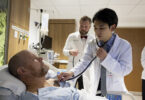Athens, Ga. – A pioneering embryologist whose work has provided insights into the process by which cancer cells spread within the body will deliver the inaugural University of Georgia Cancer Center lecture on April 23.
Malcolm Steinberg, professor emeritus in the department of molecular biology at Princeton University, will deliver a lecture titled “Cell-cell adhesion in tissue assembly and malignant invasion,” at 4 p.m. on Wednesday, April 23, in room S175 of the Paul D. Coverdell Center for Biomedical and Health Sciences. A reception will follow his lecture.
Steinberg is best known for formulating the groundbreaking “differential adhesion hypothesis,” in the 1960s. The hypothesis explains how different cell types in a normally developing organism – those destined to become the skin and internal organs, for example – interact and bind with each other to organize themselves into properly structured body parts.
Cell adhesion also plays a critical role in malignant invasion and metastasis, the process by which individual cancer cells break off from the primary tumor site and establish secondary tumor sites in other parts of the body.
“We’re honored to have Professor Steinberg deliver the first UGA Cancer Center Lecture,” said Michael Pierce, director of the UGA Cancer Center and the George E. and Sarah F. Peters Mudter Professor in Cancer Research. “His work highlights how investments in basic research can pay dividends later on as the knowledge is applied to human health conditions such as cancer.”
Steinberg is a fellow of the American Association for the Advancement of Science and author of more than 150 scientific papers. He also has served as a trustee of the Society for Developmental Biology and the Marine Biology Laboratory at Woods Hole; as president of the Developmental Biology Division of the American Society of Zoologists; and as a member of the board on biology of the National Academy of Sciences/National Research Council.
To learn more about the UGA Cancer Center, see www.uga.edu/cancercenter.







